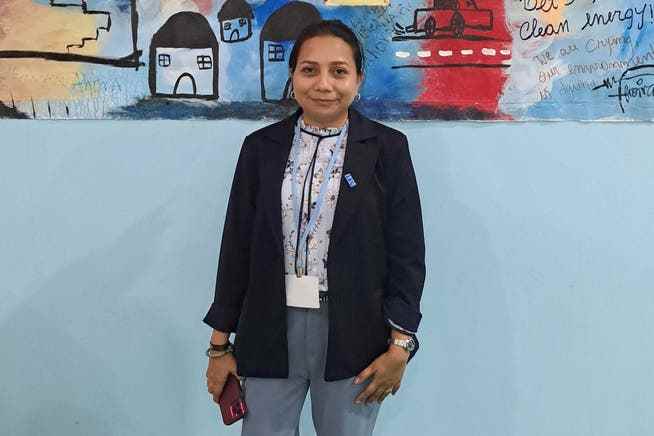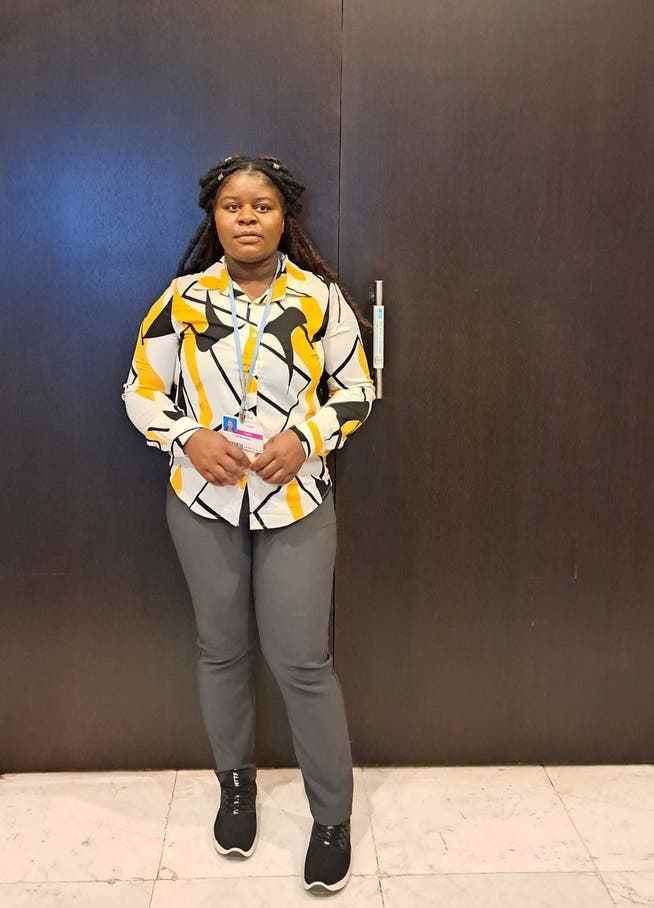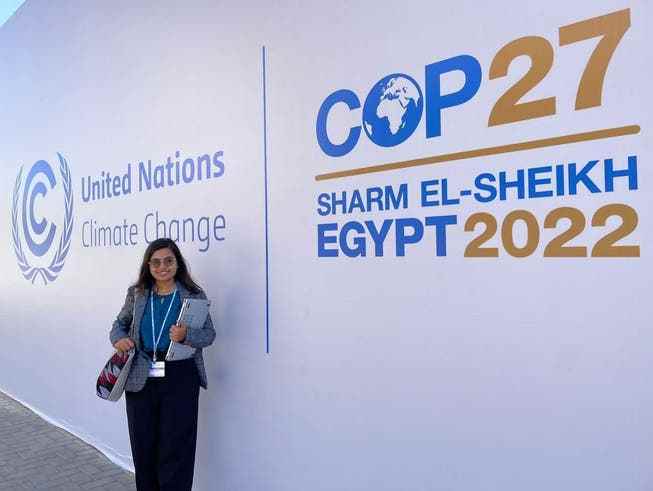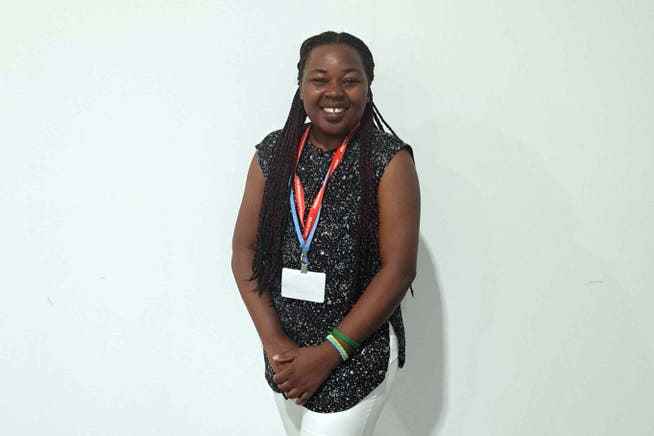As youth activists mobilize outside the doors of the COP27 negotiation room, a new generation of negotiators is also emerging. They want to be involved in the decisions that affect their future, even if it may take years to see results.
Young delegates meet in the first children and youth pavilion at a world climate conference.
Justina Aurea Belo. Brenda Mwale. Hyacinthe Niyitegeka. Prakriti Koirala. They come from East Timor, Malawi, Rwanda and Nepal. They are in their mid-twenties, late twenties or early thirties. And they are negotiating at the world climate conference in Sharm el-Sheikh. The four women want to ensure that the concerns and interests of their small countries, which are badly affected by climate change, do not go completely unheard.
“If I just stay outside the door, I can’t take part in the negotiations inside where the decisions are made,” says Justina Aurea Belo from East Timor. She coordinates a group of young delegates from poor developing countries. In the UN language of climate conferences, these countries are united in the group of least developed countries. “I have to be inside,” she says emphatically. She is primarily concerned with the one topic that dominates the conference this year: Who pays for the climate-related damage and losses that are already occurring today and are in some cases unavoidable?

Justina Aurea Belo from Timor-Leste at the World Climate Conference. This is her second time at a COP.
East Timor, Belo’s origin, has contributed next to nothing to global greenhouse gas emissions. This fact does not protect the island state. On the contrary, the country is already being severely affected by the violent excesses of climate change, which can make extreme weather events more frequent and more intense. Belo experienced the danger of flooding in her own home, lost distant family members. She talks about crop losses and water problems in her home country. Either there is too much water, too little, or none at all, she says. Women are particularly affected. They are the ones who have to fetch water to feed the family.
In the coming days she will continue to work to ensure that the rich industrialized countries, above all Europe and the USA, provide more money. “If industrialized countries want to continue doing business, then you have to pay for losses and damages,” says Belo. In their own countries, they should focus more on renewable energies. For the affected developing countries, on the other hand, money is needed. “Climate-related loss and damage is a reality. We can no longer adapt to everything,” she warns.
Youth voices on the street and in the negotiations
On Friday, young climate activists from the Fridays for Future movement protested on the premises in front of the conference and meeting rooms. At a press conference a few days earlier, youth activists had already complained about the inflexibility of international climate policy. Mitzi Jonelle Tan from the Philippines says she couldn’t find the words to talk about the climate crisis. Young people are tired of not being heard.
We are striking live from COP27 demanding for #PeopleNotProfit other #ShowUsTheMoney! pic.twitter.com/RVdrnV4Typ
— Fridays For Future (@Fridays4future) November 11, 2022
Many teenagers and young adults are frustrated by the sluggish pace of international climate policy. Given the numbers, that’s understandable. As recently as Friday, an international group of scientists warned that global CO2emissions this year will increase by 1 percent year-on-year, reaching a record high. So the temporary slump during the pandemic has already been more than made up for.
Greta Thunberg, who has been the global symbol of Fridays for Future since 2018, already criticized the climate negotiations as a mere greenwashing event. She didn’t come. Still, many youth activists are on the ground, even as dozens have faced skyrocketing hotel prices, canceled room bookings and other complications in recent days – incidents that European delegates on the ground are watching with concern.
How do you deal with frustration?
But even those who have traveled to Egypt to hustle and bustle through technically demanding negotiations know what it means to be frustrated. Brenda Mwale is 28 years old and works as an activist with young women in Malawi. She says that it can also get emotional in the conference rooms. Especially when the other person cannot – or does not want to – understand what you want to convey.
But that’s exactly what the negotiations are about: “Being frustrated doesn’t mean that I mean unleash anger. I have to find diplomatic words and convey my interpretation as a young person, »said Mwale. Of course, the balance of power within the UN negotiations is unequal, reflecting the geopolitical structure of the world. And yet: In the negotiation rooms, each country’s vote has the same formal weight, decisions can only be made unanimously.

Brenda Mwale from Malawi is standing in front of one of the many negotiation rooms where sentences, individual words and commas are being wrestled with.
Everyone has a role to play here, says Mwale. Many young activists wanted politicians to take responsibility. They wanted to stir up rhetoric. She, on the other hand, wants to ensure that young people’s commitment is carried into the negotiation rooms. 25-year-old Prakriti Koirala from Nepal takes a similar view. She is here so that those around her will also listen to her voice. “You can’t change anything if you don’t deal with the political measures,” says Justina Aurea Belo.
Fear of the future and glimmers of hope
All four negotiators radiate seriousness without appearing stiff. The answer to the question of what makes a good negotiator is: be well prepared, familiarize yourself with the subject matter, learn, read, educate yourself. They convey an idealism that is at once grounded in reality and patient. You are aware of the peculiarities and limitations of the multilateral process. After all, you need staying power for a climate negotiation. Breakthroughs only happen over years, if not decades. And often they are packaged and hidden in technical formulations that remain incomprehensible to outsiders and only slowly unfold their effect in the real world.
It is doubtful at the end of the conference whether a new fund for climate-related damage will be a decision, as many developing countries are demanding. European negotiators, whether from Switzerland or the EU, are critical of the idea. Instead of tediously setting up a new financing structure, it is more effective to use the existing initiatives and programs to ensure the necessary cash flows, so the argument goes.
This disappointing prospect does not deter the four young negotiators from their assignment. Prakriti Koirala also does not believe that a fund will be established at this COP. But that could change in the coming negotiations, she says. There is no other option but to continue. Brenda Mwale is also preparing for many years of negotiations and has a long-term plan for herself. At some point she would like to become one of the leading negotiators, possibly even speak for the group of developing countries, she says.

Prakriti Koirala from Nepal is at a COP for the second time – and says she is increasingly finding her voice.
“One way or another, I will one day attain a leadership position in my country,” agrees Justina Aurea Belo with a laugh. As a woman, she has to overcome many hurdles in her homeland that men are not exposed to. But her experience at COP-27 helps her to prepare for the future.
In order to coordinate the group of young negotiators, communication takes place via Whatsapp. You exchange ideas at regular meetings. Not all young delegates are as committed as the four women. A climate negotiation is chaotic and can quickly become overwhelming, as they all experienced at their first COP. Sharm El-Sheikh is now her second climate conference. Thanks to the support of NGOs such as Oxfam and Irish Aid, they were able to come here. Erin Roberts, a researcher at UK think tank Overseas Development Initiative, promotes the initiative. She negotiated for developing countries and island states for years. Roberts hopes to develop a formal structure in the coming years to give young negotiators a jump start – if there is money to do so. Everything is still very informal, she says on the phone. A lot is done by word of mouth.

Hyacinthe Niyitegeka from Rwanda wants to ensure that the interests of those countries that are already suffering from climate damage are represented.
Prakriti Koirala says without support and training over the past year, she would not have had the confidence to speak out. It’s scary to speak to “veterans” who have been there for 27 years. At the interim negotiations that took place in Bonn in the summer, she would not have dared. Here in Sharm el-Sheikh it is. “I see a little change in myself,” she says. Confidence grows. Hyacinthe Niyitegeka also says: “You have to stay strong, you mustn’t let yourself be fooled.” It’s about conveying the realities of climate change. “We are affected by it. We lose lives. Our economies suffer from the losses».
For the four women, it’s about more than their own state of mind. That comes through clearly in every conversation. “When I talk, Brenda doesn’t talk. It speaks Malawi. And when I feel intimidated, I think about how many lives depend on my intervention. Millions of lives are at stake,” says Brenda Mwale.
